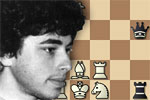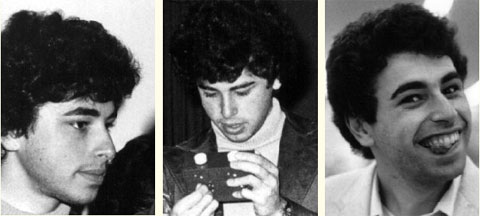


ChessBase 17 - Mega package - Edition 2024
It is the program of choice for anyone who loves the game and wants to know more about it. Start your personal success story with ChessBase and enjoy the game even more.
Dennis Monokroussos writes:
You know him as the driving force behind the Prague Agreement, which eventually led to the reunification of the world championship title(s), and before that, he was a leading member of the very important GMA. He has written some excellent chess books, founded and wrote for the sadly missed Inside Chess, and serves as a regular commentator for Playchess.com during big events like Wijk aan Zee. But did you know that he has actually WON the tournament? Yasser Seirawan has been an elite grandmaster for almost 30 years, and in the 80s, in his heyday, he was one of the very few players who was thought to have a chance to challenge the Karpov/Kasparov dynasty.

The 19-year-old Yasser Seirawan around 1980
As mentioned above, one of Seirawan’s great successes was his win in the prestigious Wijk aan Zee tournament. In 1980, while still just 19 years old, he tied for first with Walter Browne. Scoring an outstanding 10/13, he finished ahead of super-GMs like Korchnoi and Timman, and thereby showed the world that a new star had appeared in the firmament. To get an idea of his play, we’ll take a look at one of his wins from that event, against then-Yugoslav GM Vlatko Kovacevic (who once defeated Bobby Fischer in 30 moves). Seirawan used the Pirc, as he often did, and Kovacevic played the “Spike”, a very aggressive line with a quick g4. Such an attacking scheme can scare many players, and with good reason. GM Donner had lost to a then-unknown Chinese player in just 20 moves a couple of years prior to our game (Liu Wenzhe, now best known as the author of The Chinese School of Chess), and Kovacevic probably hoped for an equally brutal finish.
They say be careful what you wish for, as you might get it. And Kovacevic got it, alright, as Seirawan found a brilliant and unexpected way of taking over the initiative. At one point, around move 10, White had a lead in development, space, and apparently the attacking prospects as well. Five moves later, the momentum had shifted, and Seirawan kept increasing his control until White’s position was simply pitiful. It’s a beautiful, instructive, and most unusual game, and I invite you to join me later today – Wednesday! – as we examine it.
Note again: the show will be at the usual time, 9 p.m. ET, but not the usual day. We’re moving to Wednesdays, so re-set your weekly chess calendars for our great games series. Hope to see you tonight!
Dennis Monokroussos' Radio ChessBase lectures begin on Wednesdays at 9 p.m. EDT, which translates to 01:00h GMT, 02:00 Paris/Berlin, 11:00h Sydney (on Friday). Other time zones can be found at the bottom of this page. You can use Fritz or any Fritz-compatible program (Shredder, Junior, Tiger, Hiarcs) to follow the lectures, or download a free trial client. |
You can find the exact times for different locations in the world at World Time and Date. Exact times for most larger cities are here. And you can watch older lectures by Dennis Monokroussos offline in the Chess Media System room of Playchess:

Enter the above archive room and click on "Games" to see the lectures. The lectures, which can go for an hour or more, will cost you between one and two ducats. That is the equivalent of 10-20 Euro cents (14-28 US cents).
 Monokroussos in Mexico: world championship 2007 |
Dennis Monokroussos is 41, lives in South Bend, IN, where he teaches chess and occasionally works as an adjunct professor of philosophy at the University of Notre Dame and Indiana University-South Bend.
At one time he was one of the strongest juniors in the U.S. and has reached a peak rating of 2434 USCF, but several long breaks from tournament play have made him rusty. He is now resuming tournament chess in earnest, hoping to reach new heights.
Dennis has been working as a chess teacher for ten years now, giving lessons to adults and kids both in person and on the internet, worked for a number of years for New York’s Chess In The Schools program, where he was one of the coaches of the 1997-8 US K-8 championship team from the Bronx, and was very active in working with many of CITS’s most talented juniors.
When Dennis Monokroussos presents a game, there are usually two main areas of focus: the opening-to-middlegame transition and the key moments of the middlegame (or endgame, when applicable). With respect to the latter, he attempts to present some serious analysis culled from his best sources (both text and database), which he has checked with his own efforts and then double-checked with his chess software.